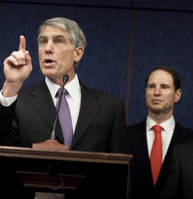 June 25, 2013 10:09 AM UTC
June 25, 2013 10:09 AM UTC

FOX 31's Eli Stokols updates on Sen. Mark Udall of Colorado's campaign to hold the National Security Agency accountable following contractor Edward Snowden's disclosures of ongoing large-scale collection of American domestic telephone records:
Colorado Sen. Mark Udall called on the National Security Agency to correct inaccurate and misleading information provided by the agency in a fact sheet about its cellular surveillance programs that were first made public by whistle-blower-turned-international fugitive Edward Snowden.
In a letter to NSA Director, General Keith Alexander, Udall and Oregon Sen. Ron Wyden, both Democrats, urge the agency to correct its fact sheet, which, they allege, portrays that privacy protections are “stronger than they actually are.”
“As you have seen, when the NSA makes inaccurate statements about government surveillance and fails to correct the public record, it can decrease public confidence in the NSA’s openness and its commitment to protecting Americans’ constitutional rights,” Udall and Wyden write. [Pols emphasis]
As the public wrestles with the implications of continued large-scale domestic surveillance under President Barack Obama–which has undeniably been problematic for morale in the liberal wing of the Democratic Party–Sen. Udall is emerging as a real hero on an issue dear to liberal Democrats, as well as libertarian-minded independents and Republicans. This does more than simply insulate Udall from the fallout of these disclosures of unpopular surveillance measures continuing under Obama: it sets him up as a leader on one of the foremost political questions of our time, staking out a position that many on both sides will judge to be the right side of history.
We don't want to cheapen what Udall is doing by merely calling it good politics, even though it is.
Subscribe to our monthly newsletter to stay in the loop with regular updates!
Comments